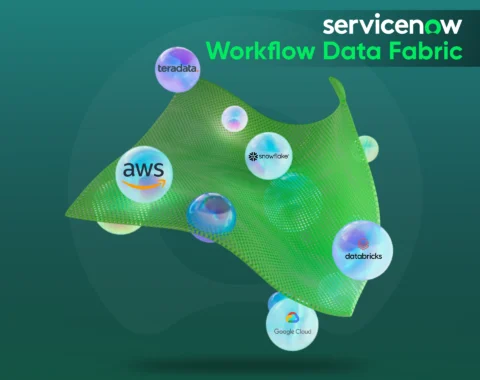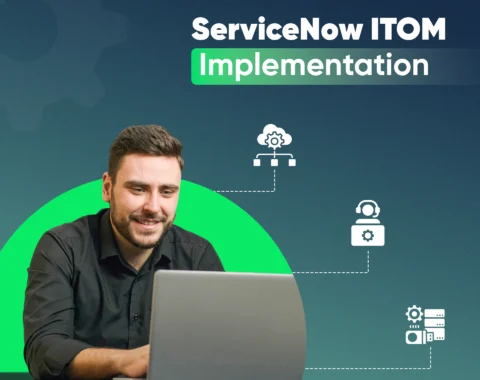Collect, process, correlate, and analyze data to identify patterns and anomalies to create an alert and initiates a response process based on predefined rules and policies with ServiceNow Event Management.

ServiceNow Event Management
ServiceNow Event Management is a module within the ServiceNow platform that allows organizations to monitor and manage their IT infrastructure and applications. It provides real-time visibility into IT events and helps teams quickly identify and resolve issues before they impact business operations. Also, it automatically collects data from various sources, such as system logs, performance metrics, and monitoring tools. The data is then processed, correlated, and analyzed using ServiceNow’s machine-learning algorithms to identify patterns and anomalies.
ServiceNow Event Management Benefits
Increased visibility
Provides real-time visibility into IT events across the organization, allowing IT teams to quickly identify and resolve issues before they impact business operations.
Improved collaboration
IT teams can collaborate more effectively by sharing information and working together to resolve issues, resulting in faster incident resolution & reduced downtime.
Automation
Automates many of the processes involved in event monitoring and response, reducing the workload on IT teams and allowing them to focus on more strategic tasks.
Predictive analytics
ServiceNow machine learning algorithms can help predict potential issues before they occur, allowing IT teams to address them proactively.
Integration with other ServiceNow modules
Integrates with other ServiceNow modules, such as Incident Management and Problem Management, to provide a comprehensive IT service management solution.
Reduced Mean Time to Repair (MTTR)
Provides real-time visibility into IT events & automating the event response process. It enables IT teams to quickly identify the root cause of an issue and take appropriate action.
ServiceNow Event Management Roles
EM Administrator:
Responsible for configuring and managing Event Management, including creating event rules, configuring notification policies, and managing integrations with other IT monitoring tools.
EM Operator:
Responsible for monitoring and responding to events in real time. They receive notifications when an event occurs, & they must define the event severity, assess the impact, and take appropriate action.
EM Business Analyst:
Responsible to analyze Event Management data & provide insights to optimize IT service delivery. They use ServiceNow reporting and analytics tools to identify trends & patterns in event data.
EM Viewer:
Responsible to view all the data in the ServiceNow event management process. This role has read-only access to Event Management data and is responsible for viewing events and reports.
EM Service Desk Agent:
Works with ServiceNow Incident Management. They are responsible for creating and managing incidents based on events detected by Event Management for better tracking and monitoring.
Service Desk Manager:
Oversees the Service Desk Agents via the Now platform. They are responsible for managing the incident resolution process based on events detected by Event Management reports and data.
ServiceNow Event Management Connectors
SNMP Trap Connector
Allows receiving & processing of the SNMP traps generated by network devices and other IT systems
Syslog Connector
Allows receiving and processing System Logging Protocol (Syslog) messages generated by IT systems and applications.
JMX Connector
Allows monitoring Java Management Extensions (JMX) metrics generated by Java-based applications.
ServiceNow Connector
Allows integration with other ServiceNow modules to provide a comprehensive IT service management solution.
REST API Connector
Allows integration with any system that exposes data through a Representational State Transfer (REST) API.
ServiceNow Discovery Connector
Allows collecting data from ServiceNow Discovery that automates the discovery & mapping of IT infrastructure and app.
ServiceNow Event Management Process
The ServiceNow Event Management process involves the following steps:
Event Detection
Event Management Correlation
Event Prioritization Prioritizes
Alert Notification
Event Escalation
Event Resolution Provides
Event Analysis
ServiceNow Event Management Properties
Event Filtering Properties
Allow administrators to configure event filtering settings. Administrators can specify event inclusion and exclusion criteria, such as event severity levels or source.
Event Aggregation Properties
Allow administrators to configure event aggregation settings. Administrators can specify criteria for event grouping, such as time windows or event type.
Notification Properties
Allow administrators to configure notification settings. Administrators can specify notification recipients, notification templates, and notification channels.
Correlation Properties
Allow administrators to configure event correlation settings. Administrators can specify criteria for event correlation, such as event similarity and relationship mapping.
Performance Properties
Allow administrators to configure performance settings. Administrators can specify criteria for event processing, such as batch sizes and maximum event limits.
Integration Properties
Allow administrators to configure integration settings. They can specify integration parameters for external systems and apps, such as API endpoints and authentication credentials.
How can Aelum Consulting help with ServiceNow event management?
Aelum Consulting can help organizations implement, configure, and manage ServiceNow Event Management. Our team of ServiceNow experts can work with organizations to design and deploy an effective event management solution that meets their specific needs and requirements.
Our ServiceNow Event Management services include
Implementation and Configuration
We can help organizations implement and configure ServiceNow Event Management, including setting up event rules, workflows, and integrations with other IT tools.
Customization and Integration
We can customize ServiceNow Event Management to meet an organization’s unique needs, including integrating with other ServiceNow modules or third-party IT tools.
Event Analytics and Reporting
We can help organizations leverage the event analytics and reporting capabilities of ServiceNow Event Management to gain insight into their IT operations and make informed decisions
Training and Support
We provide training and support for ServiceNow Event Management to ensure that organizations can effectively manage their IT events and incidents.
ServiceNow Event Management Flow
Event Generation
The first step in the ServiceNow Event Management flow is the generation of IT events. Various sources, such as system logs, network devices, and application monitoring tools, can generate it.
Event Processing
Platform processes the event after generating one. It is classified, normalized, & enriched with additional data while processing. Then stored in the ServiceNow Event Management database for further processing.
Event Correlation
Analyze correlation with other events. ServiceNow Event Management uses correlation rules to identify relationships between events & define their root cause. Grouped to create an incident for the root cause event.
Incident Management
Assign the created incident to the appropriate IT team for resolution. The incident is tracked through its lifecycle, from initial creation to resolution, using the ServiceNow incident management process.
Event Analytics
Get real-time analytics & reporting capabilities with event management. You can use these capabilities to monitor event activity, identify trends and patterns, and make informed decisions about IT operations.
Event Automation
ServiceNow Event Management can automate incident creation, assignment, and resolution processes. Automation helps to streamline IT operations and reduce response times.
Our Clients






















Frequently Asked Questions
ServiceNow Event Management provides event correlation capabilities that allow IT teams to identify relationships between events and determine their root cause. Event correlation involves analyzing multiple events and identifying patterns and relationships between them. By correlating events, IT teams can reduce the number of false positives and identify the most critical events that require immediate attention.
It uses a correlation engine that applies correlation rules to incoming events. Correlation rules define the conditions and criteria to be met for events to be considered related. For example, a correlation rule might specify that events from a specific source with a specific severity level and event type should be considered related.
When an event is received, the correlation engine analyzes it and compares it to existing events in the system. If the event meets the criteria specified in a correlation rule, it relates to the other events. The correlation engine then groups the related events together and identifies the root cause of the event group.
After identifying the root cause of the event group, ServiceNow Event Management can automatically create an incident and assign it to the appropriate IT team for resolution. It helps to streamline incident management processes and reduce resolution times.
ServiceNow provides comprehensive documentation and support for event correlation in Event Management, including information on how to create and manage correlation rules. By using event correlation, organizations can improve their incident management capabilities and reduce the impact of IT events on their operations.
ServiceNow Event Management offers several plugins that provide additional functionality to help organizations manage IT events more effectively. Some of the key plugins include-
- Event Management for Infrastructure Extends the capabilities of Event Management to support infrastructure events. It provides out-of-the-box integrations with popular infrastructure monitoring tools, such as Nagios. Also, it delivers a unified view of infrastructure events.
- Event Management for Applications Extends the capabilities of Event Management to support application events. It provides out-of-the-box integrations with popular application monitoring tools, such as AppDynamics, and provides a unified view of application events.
- Event Management for Security Operations Extends the capabilities of Event Management to support security events. It provides out-of-the-box integrations with popular security tools, such as Splunk and IBM QRadar, and provides a unified view of security events.
- ServiceNow Predictive Intelligence Extends the capabilities of machine learning algorithms to provide predictive analytics for IT events. It can help identify potential issues before they occur and provide recommendations for event resolution.
ServiceNow Event Management provides APIs that allow developers to interact with Event Management data programmatically. These APIs enable organizations to automate event management processes and integrate Event Management data with other systems and applications. The following are some of the key APIs offered by ServiceNow Event Management
- Event API This API allows developers to create, read, update, and delete events in Event Management. Developers can use this API to automate event management processes, such as event creation and resolution.
- Alert API This API allows developers to create, read, update, and delete alerts in Event Management. Developers can use this API to automate alert notification processes and integrate alert data with other systems and applications.
- Event Correlation API This API allows developers to retrieve correlation data for events in Event Management. Developers can use this API to identify the root cause of an issue and automate the correlation process.
- Notification API This API allows developers to create and manage notification policies in Event Management. Developers can use this API to customize notification policies based on their needs and requirements.
- Integration API This API allows developers to integrate Event Management with other systems and applications. Developers can use this API to retrieve and update data from external systems and applications and correlate this data with Event Management data.
- Machine Learning API Allows developers to leverage machine learning models to analyze event data and identify patterns and anomalies. Developers can use this API to integrate machine learning capabilities into their event management processes and improve the accuracy and efficiency of event management.
The ServiceNow event management dashboard displays a variety of information related to IT events, including event volume, event severity levels, event source, event status, and event resolution times. The dashboard can also display event correlation, root cause analysis, and incident escalation information.
ServiceNow Event Management can manage various types of events, including system logs, network events, application events, and security events.
ServiceNow Event Management uses correlation rules to correlate events. Correlation rules define the conditions and criteria that must be met for events to be considered related. When an event is received, the correlation engine analyzes it and compares it to existing events in the system. If the event meets the criteria specified in a correlation rule, it relates to the other events.
Yes, ServiceNow Event Management can automate incident creation, assignment, and resolution processes. Automation helps to streamline IT operations and reduce response times.
ServiceNow Event Management provides real-time event analytics and reporting capabilities. IT teams can use these capabilities to monitor event activity, identify trends and patterns, and make informed decisions about IT operations.
Aelum Consulting can help organizations implement, configure, and manage ServiceNow Event Management. Our team of ServiceNow experts can work with organizations to design and deploy an effective event management solution that meets their specific needs and requirements.









































